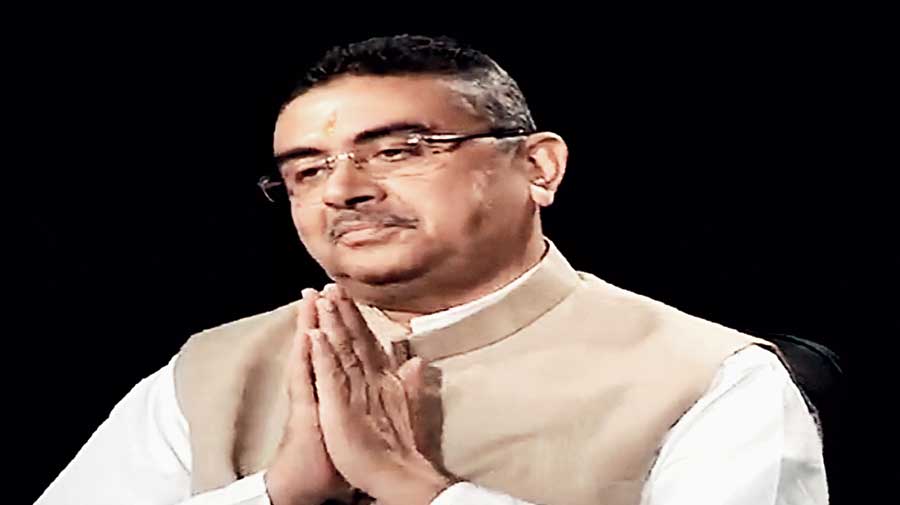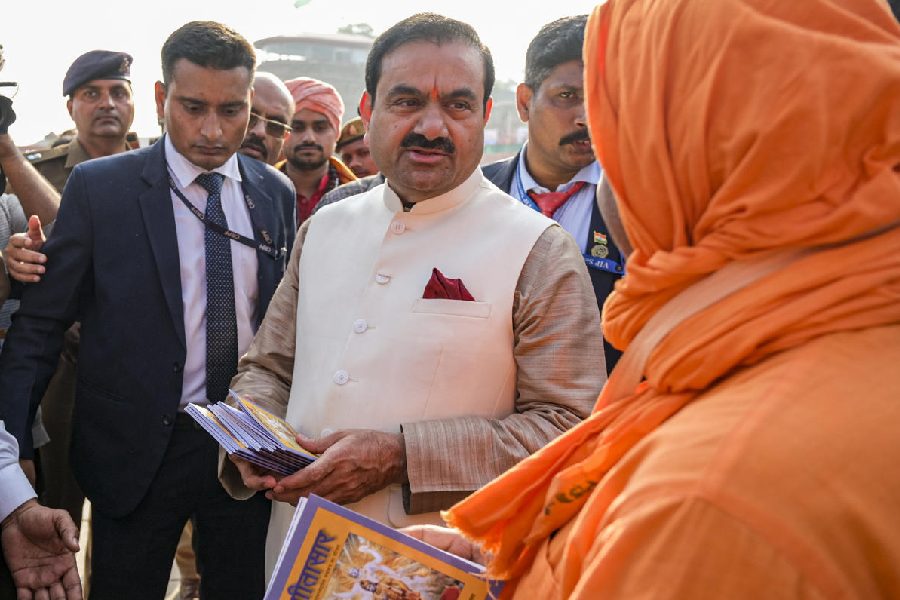Trinamul Congress turncoat Suvendu Adhikari was lost for words in an ABP Ananda interview when he was asked if he stuck to his oft-declared Gandhian ideology or subscribed to Sangh figure Syama Prasad Mookerjee’s stand vis-à-vis a particular episode in the Quit India movement.
With hands folded, Suvendu, the BJP’s catch of the season, sought forgiveness for not answering the question from the channel’s executive vice-president Suman De and stepped away.
The 50-year-old Adhikari repeatedly declares himself as an ideological descendant of the Tamralipta Jatiya Sarkar (national government) of 1942 and its protagonists and iconic Gandhians — such as Satish Chandra Samanta, Sushil Kumar Dhara, Ajoy Mukherjee and Matangini Hazra.
De quoted Syama Prasad Mookerjee on the movement when he was a minister of Bengal Province (1941-43) in the A.K. Fazlul Haq’s coalition government.
The question, the final one in the 54-minute interview, made Adhikari visibly uncomfortable and he tried to excuse himself from evaluating Mookerjee over his view of the landmark movement of 1942. Mookerjee is a foremost figure of the saffron ecosystem but his legacy is controversial.
The relevant excerpts of the interview (in Bengali) follow.
De: My final question. Whenever someone switches parties, there is a change in the ideological perspective. Let’s take for instance, you repeatedly say in your public addresses — all of us think so too — the Tamralipta Jatiya Sarkar of 1942 is extremely important in our state’s and nation’s history. You are a self-proclaimed ideological disciple of, the likes of Satish Samanta, Ajoy Mukherjee… names that will forever be remembered…. But the party you have switched to today, the predecessor of that was the Bharatiya Jana Sangh (the political arm of the RSS), its founder Syama Prasad Mookerjee had a completely different view of the 1942 movement. Just three months later, he said: “I do not think that the meaningless indiscipline and destructive work that was done in the past three months, it would be helpful to the cause of gaining Independence for our country.” (Quoting from Rashtro Shongrameyr ek Odhyay, Syama Prasad Mookerjee, Page 61)
Just think, “meaningless indiscipline”, “destructive”, he says of the 1942 movement. Will you, Suvendu Adhikari, go by your own evaluation? Or will you go by that of the very respectable Syama Prasad Mookerjee?
Adhikari: See, I will not evaluate Dr. Syama Prasad Mookerjee on the basis of this particular statement. I do not have that right.
De: I am not asking you to do that though. I am asking you, while evaluating 1942, would you give precedence to your own assessment, or will you give precedence to Syama Prasad Mookerjee?
Adhikari: No. You have asked me this question in relation to such a man, I am skipping this one (with folded hands). (De laughs out) You have the right to ask that question. I too have the right to step away.
De: Indeed. (Adhikari laughs out)
(What De did not add, possibly on account of Adhikari’s apparent hurry to step away, was another key quote from Page 116 of the same book, where Mookerjee said: “Now, in a state of war, a national government should be formed in a way that the war can be conducted in intensive cooperation with the friendly side.)
The Tamralipta Jatiya Sarkar was a historic, independent parallel government established in Tamluk, in Adhikari’s backyard, during Mahatma Gandhi’s Quit India Movement.
The Tamralipta Jatiya Sarkar had set up police stations, military departments, courts, a system for revenue collection, and even its own newspaper, Biplabi (The Revolutionary). The so-called national government functioned between December 17, 1942, and August 8, 1944. It was dissolved on the explicit directions of Mahatma Gandhi, taking note of the end of the Quit India Movement.
Adhikari’s icons like Ajoy Mukherjee went on to become a three-term chief minister of Bengal. Satish Chandra Samanta was a five-term Parliamentarian in Independent India.
Sushil Kumar Dhara — who passed away at 99 in 2011 and was often visited by Adhikari — was a three-term MLA and a one-term MP.











